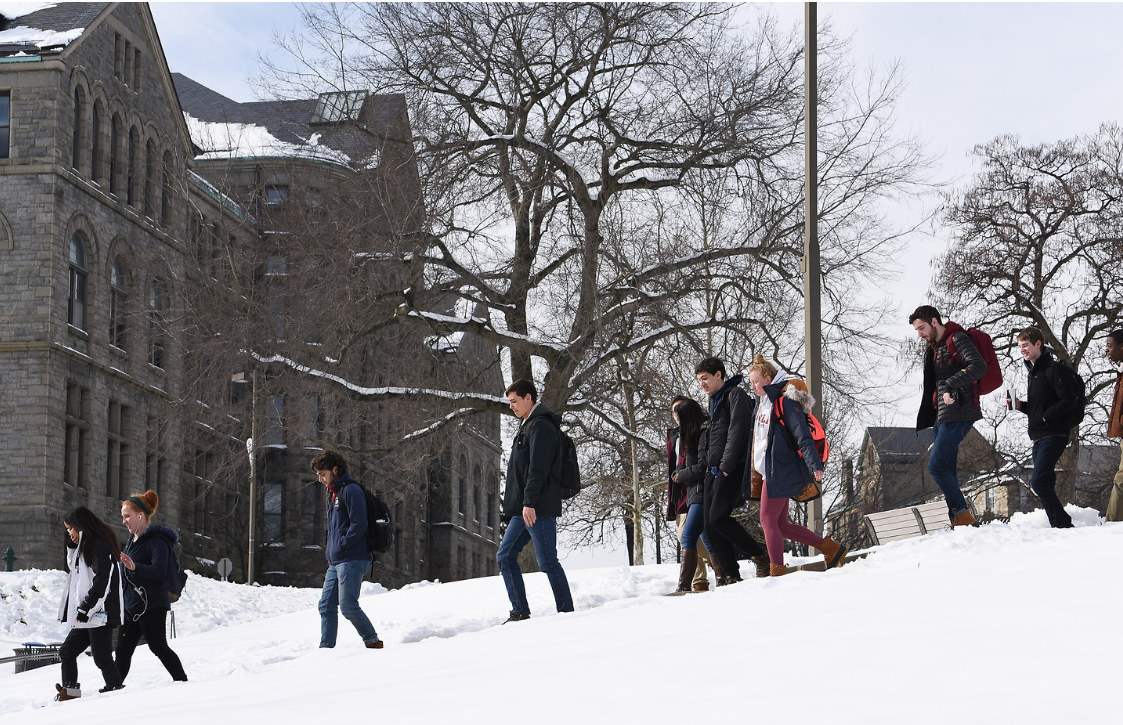It’s January, which means it’s the time of year for new resolutions.
Have you ever considered how to include sustainability in your resolutions? It may surprise you, but a lot of the most common resolutions – eating healthier, being more active, spending less money, trying new things – are also sustainable!
Eat Local and Eat Plants
Eat healthier this year by focusing on locally grown, organic food and eating more plants.
Try buying some of your produce at farmers markets or small, family run grocery stores. Not only does buying local support our local farmers and grocers, but there is more transparency about where your food comes from. It is much easier to ask a farmer at the Monroe Street Farmers Market about what type of produce they grow and how they grow it than a national grocery store chain. Many farmers market vendors also have tips on the best ways to store and cook their produce.
Try eating more plants. You do not need to be a vegan or vegetarian to eat less meat! Try a small change – like meatless Mondays or meatless lunches – to explore new recipes and become more familiar with plant-forward meals. You may find some new favorite go-to dishes!
Interested in growing your own produce? Join the Catholic University Community Garden! Students, staff, and faculty members welcome. Contact sustainability@cua.edu to get involved.
Be Active
An active lifestyle is key to a healthy and happy life! Try finding new ways to be more active in the new year.
- Going across town? Try using public transportation. Catholic University is located on the Metro’s Red Line and there are numerous bus stops near campus.
- Staying in the neighborhood? Go for a walk or bike if you are able. There is a Capital Bikeshare station on campus and bike racks all around campus and the neighborhood.
- Want some fresh air? DC has a wonderful selection of outdoor spaces for all residents to enjoy. Explore the gardens at the National Arboretum, the hiking trails through Rock Creek Park, the towpath along the C&O Canal, or the monuments and museums along the National Mall.
Even in the cold weather it is important that we all find ways to be active and enjoy the outdoor spaces in our city!
Spend Less and Waste Less
What do you do when a sweater or sock has a hole in it? What about when you finish a semester with a partially filled notebook? Or when you have the urge to update your wardrobe or redecorate?
The wallet and earth friendly answer to all these questions is to spend less and waste less! (Or more specifically: sew the hole, use the rest of the notebook next semester, and reimagine your existing wardrobe and decorations!) Mass consumption – constantly buying new and more things – is a major contributor to environmental degradation and an empty wallet.
Instead of tossing out things that may no longer be perfect or new, try to give them new life. Repair items that are slightly broken, use items fully until they are beyond use or repair, and be creative and repurpose or reimagine what you already have rather than buying new. You will learn some new skills and release your creativity – which can be a valuable form of self-care during the academic year.
If you're interested in swapping clothes and household items, check out Cardinal Closet! Located in McMahon B02, Cardinal Closet is Catholic University's free, student-run thrift store. Bring clothes or items you no longer want, and take some new items home with you!
Try DIY
Have you ever wondered what to do with veggie or fruit scraps that are still good but not enough for a full meal? Have you ever wondered whether all those cleaning supplies in your closet are all that different from one another? Take your curiosity and turn it into some DIYs!
Veggie and fruit scraps make delicious pickles and jam. Many veggies – cucumbers, green beans, carrots, garlic, and more – can be turned into pickles using only the veggie, salt, water, and an airtight container (such as a mason jar). All you need for jam is a fruit high in pectin (think apples, plums, blackberries), sugar, lemon juice, and a stove. Recipes are easy to find online and yield delicious results!
Many cleaning supplies today are redundant and you can easily replace some with DIYs. For instance, Castile soap is a vegetable-based soap that can be diluted to make hand sand, dish soap, body soap, disinfectant, laundry detergent, and even bug spray. Vinegar and baking soda are common ingredients in green cleaners and can be used in all-purpose cleaners and homemade disinfectant wipes.
There are endless sustainable DIYs out there. Find a recipe, green cleaning, or other sustainable living blog (there are many!) and try some new practices that reduce your waste and are good for you and your home.
Donate or Volunteer
Support the people and places in our community by donating or volunteering in the new year. The best way to feel a part of any community is to be actively involved, so find an organization or two with a mission you support and find a way to help out.
Campus Ministry can help you on your volunteering journey. Check out their website for information on service opportunities in the Brookland neighborhood and wider DC community.
No time for volunteering? Consider donating money to your favorite organizations.
Reflection
When it comes to eating healthier, being more active, spending less money, trying more DIYs – and any sustainability action or resolution – focus on progress, not perfection. Eat less meat, buy some food from the farmers market or the organic section at the grocery store, find some eco-friendly swaps, etc. Challenge yourself in this new year and beyond to implement some sustainable resolutions. You will thank yourself!

